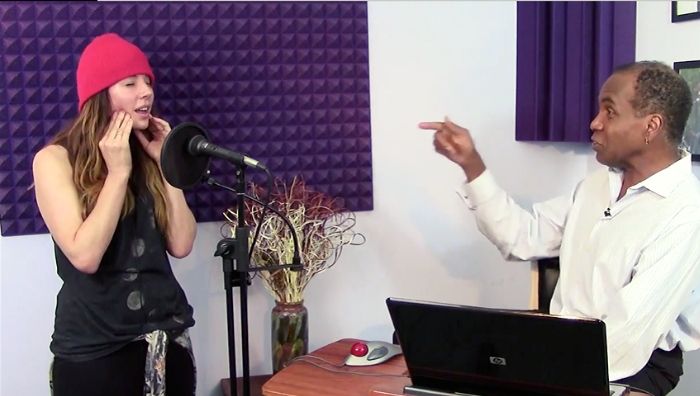How To Sing Properly – The Lip Roll Exercise
If you want to know how to sing properly there is one singing exercise in particular that will cause dramatic improvements in your voice.
The name of this exercise is the “lip roll”. Some people also call the exercise the “lip trill”.
It’s very possible you’ve seen this vocal technique used before, but there are most likely some aspects and “invisible tricks” that you haven’t noticed.
On this page you will learn these things, and how to use the exercise to cause impressive improvement in your voice.
Before we get into it, realize this. If you were to practice this exercises and only this exercise for 15 minutes a day…
… You will hear a very noticeable improvement in your tone quality… and you will be able to navigate your vocal range much easier. It really is a phenomenal little singing technique!
Let’s get started by watching this video demonstration.
The Secret To Star Singing
Click HERE For The Secret To Star Singing
The Secret To Star Singing
Click HERE For The Secret To Star Singing
Tip #1 Getting The Lip Roll Started
In the beginning, if your technique isn’t the greatest it can be a little challenging to get the lip roll started.
A trick to help you get things going is to place your hands and hold your cheeks up. Watch the video above for a demonstration of this.
 Using your hands on your cheeks will help you get the lip roll started. Check out the video above to see the demonstration.
Using your hands on your cheeks will help you get the lip roll started. Check out the video above to see the demonstration.Now, as you practice the exercise more and more you’ll notice that you’ll have less need to use your hands on your cheeks.
What this means is your swallowing muscles are starting to sit still when your singing… This is a sign that your technique is improving and your voice is on the right track!
When your singing technique is solid you won’t have any need for your hands at all.
As a side note, this exercise really does teach you how to sing properly better than just about every other exercise… So don’t be surprised if before long you’re singing without the hands!
Sing Through Your Vocal Registers More Easily
Another thing you’ll notice as you learn how to sing properly with the lip roll exercise, is you’ll be able to sing up through your vocal range more easily.
Instead of there being noticeable gaps between your lower notes and your higher notes, this exercise will create a smooth transition. After a while, people won’t be able to hear any difference in tone quality throughout your entire range.
Tip 2# How To Sing Properly
To practice this technique properly, you need to imagine that your sound is above your cheeks.
This will keep everything in position and your sound flowing through your body correctly.
It also keeps your sound from falling back into your throat, which in the long run will cause you lot’s of problems!
Tip 3# Stop Reaching For Those High Notes
Another little singing tip to use while practicing the lip roll exercise is to “think” you’re singing down into the note as you sing higher.
This is another little trick that will keep you from “reaching up” to your higher notes.
Remember that to sing your highest notes, all that needs to happen is a little vocal chord adjustment. So there is no need to “point” your body upwards to reach that note.
If you “think” down as you go for these high notes, you’ll keep your body in position and your vocal chords will automatically make the adjustments necessary to get that note.
The Number 1 Problem Most Singers Have

Now that you have a great singing exercise to help you learn how to sing, let's talk about a big problem that holds singers back more than anything I’ve ever seen.
And I say this based on over 30 years teaching the voice. Singers come through my studio every day and there is one thing in particular we need to work on more than anything else.
The good news is that it’s a pretty easy fix. And once we’ve corrected the issue their voices immediately become so much more.
More vocal range. More freedom. Better tonal quality. Quite simply, better all round!
So
let’s take a look at what this problem is. Then you will be able to see
if you have it too… and if you do, on this page you will find the
exercises and tools to fix it once and for all.
To illustrate this lesson, I’m using the wonderful Actress Krista Allen. (You might recognize her from her work on Baywatch, Days of Our Lives or many others!) Krista is a private client of mine and we’ve been working together to develop her voice, which can open up a lot of opportunities in her profession.
Ok, so here is my lesson with Krista.
The Number 1 Problem
The problem that I am talking about is when singers are singing and using their swallowing muscles.
Any time a singer ends up with a hoarse or sore voice… or feels like their voice is being restricted… and even getting nodules or polyps…
You can pretty much guarantee that the swallowing muscles are having something to do with it.
And on the flip side, when you can remove the swallowing muscles from your singing, you will feel a wonderful sense of freedom when you sing.
So let's look at how to sing without straining by removing these muscles from your singing.
Relaxation Is The Key!
One of my biggest focuses as a vocal coach is to get these muscles to relax. We really don’t need to use these muscles when we are singing!
Let’s look at some exercises that will help you begin to keep your swallowing muscles relaxed.
A Weird And Ugly Singing Exercise That Works!
 Placing your thumb under your jaw will help you to feel when your swallowing muscles are tightening up.
Placing your thumb under your jaw will help you to feel when your swallowing muscles are tightening up.I love Kirsta’s reaction when I begin to discuss the exercise…
“This is disgusting, you’re going to look like crap!”
Haha!
But it totally works, so let’s get to it…
So the first thing to do is place your thumbs under your jaw so you can feel if you’re swallowing muscles are tightening up.
Then
we will use a humming sound on a simple scale. The key is to try to
relax your swallowing muscles every time you feel them tighten up.
Here are some tips that will help you keep these muscles out of the way:
- Try to begin each note starting with your sound positioned in the middle of your forehead
- As you sing higher, pull the notes down
- As you sing lower, sing up into the notes
What you’re doing here is re-training your body to keep these muscles relaxed as you sing.
Check out Krista as she performs the exercise (The video will begin at the correct place for the demonstration).
So Weird!
As I said, it’s a weird exercise! And it forces you to make some funny faces!
But
always remember this is just practice. Once your body has re-trained
itself to keep these muscles relaxed you will be able to sing normally
without needing to make the strange faces.
Exaggeration Is Key
One thing about this exercise which you will see in my demonstration is you really need to exaggerate the sound to position it correctly.
By
that I mean, when you start each note with your sound positioned in
your forehead, you may need to add an edge to it to keep it there.
If You Hear A Break In Your Tone - The Muscles Are Interfering
Another thing is that one clue that your swallowing muscles are interfering in your singing is you will hear a break in your tone.
You’ll find that when you get your sound positioned in the right place you’re voice will start to sound very connected. This means that you’ll be moving from the different parts of your vocal range in a very smooth way.
This is how you can build a really strong middle or “mixed
voice”, which is that sound you hear in a lot of pop and rock singers.
It’s that tonality where you can sing nice and high, but still have that
power and fullness from your chest voice (your lower register).
Let’s Watch Krista Again And See Her Progress
The thing about this exercise is that you need to be patient with it and just keep going over and over it.
You’ll
hear Krista talk about how she’s still feeling her swallowing muscles
fight her. But there is definitely progress happening. If she simply
continues to practice with a focus of letting the muscles go, there will
come a time where they completely relax.
So I really encourage you to do this exercise and stick with it over the long term.
If
there’s one thing that will help you teach yourself how to sing,
it’s letting those muscles relax. It really will give you so much more
freedom.
Your natural voice, when you’re not blocking it off will project beautifully and have a rich tonal quality.
Getting Your Richest Tonality - Positioning Your Sound In The Mask
When learning how to sing there are techniques you can use to get the best sound out of your voice.
For example, your mask is the correct place for your sound to be sitting when you sing. That’s why in this exercise we’ve been focused on starting with your sound positioned in the middle of your forehead.
Another trick I like to use which you may have seen me discuss is to keep your sound above your cheeks.
If you don’t like how your voice is sounding, positioning is usually an issue.
If your voice sounds too nasal or too muffled, it means your sound isn’t sitting in the right place.
Or
if your voice sounds too soft, it means that you’re doing something
that’s blocking off the natural flow of air that creates your sound
(usually your swallowing muscles are the culprit!).
So those are some ideas that will help you to diagnose any problems you might have.
Can you learn how to sing? Absolutely!
Check out the biggest things to takeaway from this tutorial that will help you.
Big Takeaways
- The lip roll really is a powerful exercise if you want to know how to sing properly.
- Your swallowing muscles can cause a lot of problems with your singing - you must learn to relax them when you sing
- Practice your exercises with a focus on relaxing your swallowing muscles
- Keep your thumbs under your jaw so you can feel when they tighten up
- Try to begin each note with your sound in your forehead
- Positioning your sound in your mask with give you your best tonality
Practice Away!
Practice these ideas for 15 minutes a day and you’ll be amazed at the progress you make.
There are a few other equally powerful exercises that will also have a dramatic impact on your voice…
And you can learn these exercises in an excellent free video series. To watch the video series, click the link below:
Click Here To Learn How To Sing Properly
Related Pages
Vocal Singing Lessons On Developing Your Licks And Trills
Go To Become A Singing Master Home Page
About The Author
 Roger Burnley - Vocal Coach Roger Burnley - Vocal Coach |
Roger Burnley is a vocal coach located in Hollywood, California. He has been teaching singers for over 30 years and singing for even longer than that.
Notable past and present clients include Macy Gray, Brandy, Ray J, The Beastie Boys, James Torme, Taylor Lautner, Nona Gaye, and many more.
His clients have collectively sold more than 30 million albums, with several reaching Platinum and Gold status.
Roger has been featured on VH1, TV Guide Channel, TV One,
and MTV appearing as a vocal expert.
About The Author
 Roger Burnley - Vocal Coach Roger Burnley - Vocal Coach |
Roger Burnley is a vocal coach located in Hollywood, California. He has been teaching singers for over 30 years and singing for even longer than that.
Notable past and present clients include Macy Gray, Brandy, Ray J, The Beastie Boys, James Torme, Taylor Lautner, Nona Gaye, and many more.
His clients have collectively sold more than 30 million albums, with several reaching Platinum and Gold status.
Roger has been featured on VH1, TV Guide Channel, TV One,
and MTV appearing as a vocal expert.









New! Comments
Show me you're alive! Leave a comment below...